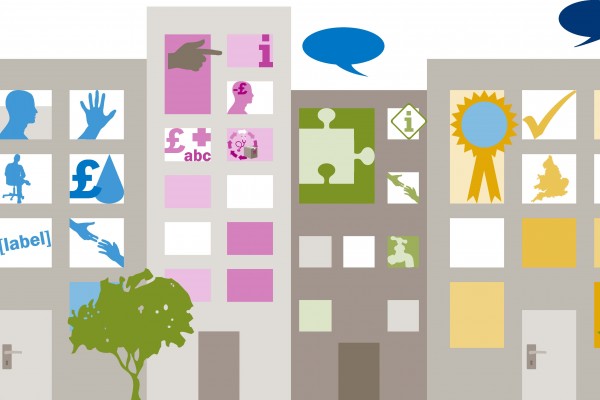This event launched Ofwat’s vulnerability report and practitioners’ guide.
Landscape
A series of short presentations set out the landscape in which the industry needs to manage the issue of customers in vulnerable circumstances.
- Keynote from Cathryn Ross (Chief Executive, Ofwat)
- The economic landscape from Hugh Stickland (CAB)
- Views of vulnerability from Matthew Vaughan-Wilson (Money Advice Trust) Caroline Newby (Alzheimer’s Society) and David Bell (BSI)
- Ofwat vulnerability focus report and practitioners’ guide from Margaréta Serfőző-Matharu (Ofwat) and Charlotte Duke (London Economics)
Sharing good practice
In each 20 minute group sessions, participants were introduced to some experience from companies, as highlighted in the report’s case studies. They then invited comment, questions or further examples from the group. Summaries are below.
Good practice in customer care and engagement
The group discussed the importance of staff training (from a company perspective), the ‘Go the extra mile’ initiative and issues of broad customer engagement. The group also considered a pilot project with the DWP focused on identifying customers who are potentially in vulnerable circumstances. Some of the key points from the discussion were:
- Signposting customers to other agencies works best when calls can be transferred by the company itself. This relies upon companies having a good working relationship with the organisations they are forwarding calls to.
- There are benefits in water companies providing training/assistance to the third sector, specifically so that other organisations are aware of the services companies provide for customers in situations of vulnerability.
- It is important to get staff training right, share examples of good customer service practice and to celebrate staff who provide good service. Companies should empower their service staff to feel confident in making the right decisions for customers.
Good practice in data gathering and sharing
The group discussed a number of topics, including using credit information agencies, offering social tariffs as a preventative measure rather than as a cure, ensuring that company systems are fit for purpose and the specific issue of Universal Credit data. The group also considered how to be aware of changes to a customers’ personal circumstances and how to prevent indebtedness. Some of the key points from the discussion were:
- How some companies have seen benefits from using data from various sources to help identify people who are in a situation of financial vulnerability, and ensure that they are on the most appropriate tariff or payment scheme.
- Sharing data can enable support to be much better targeted to individual households. For example, it has helped some companies to distinguish more reliably between customers who cannot pay because of reduced financial circumstances, and those that will not pay despite having the financial means to do so.
- One company indicated that data sharing improved the service it provides to customers. The company said that it has used data from other agencies to raise a flag to call handlers to indicate when a customer is eligible for a social tariff. The company then uses credit reference agencies to verify the customer’s financial situation and a solution can be identified and implemented within hours.
Good practice creating partnerships
The group discussed the benefits of engaging and working with stakeholders, including partnering with the CAB, Step Change and other utilities. The group also considered the importance of staying attuned to changes in local economic conditions to target support where it is most needed required. Some of the key points covered during the discussion were:
- New opportunities often arise from initial engagement with local partnerships and communities, sometimes this goes beyond achieving the original brief.
- Don’t overlook internal partnerships – for example, payment collection linked up with the team that deals with blocked drains in the same area.
- Be open to unusual partnerships as these provide helpful intelligence that may not be available from the usual sources. One company mentioned that it had successfully worked with the Salvation Army in an area to assist a number of customers whose first language was not English.
- Local partnerships help with brand building and developing trust in previously disengaged communities – for example, information gathered from helping customers with income and expenditure forms can help with tailoring support services, training staff and developing effective external communication.
Culture change issues and support options
The group provided insights from the perspective of third sector organisations. It considered whether changes in culture were necessary to ensure that vulnerability assistance is a priority for company staff. The group also discussed the options available for support/training; examples of partnership working from a perspective ‘outside’ the water industry; and the place of the BSI standard as a reference point (for resource requirements). Some of the key points from the discussion were:
- Companies observed that the methodology introduced at the last price review (PR14) introduced a massive change in approach, but also afforded companies more freedom to innovate. Several companies indicated that it might take some time to move thinking away from a “Culture of compliance”. On this point some companies observed that company leaders have a key role to play in driving forward these new ways of working, from the very top to the “shop front” of organisations.
- Data protection was identified as a common concern of some companies and a potential barrier to providing support for customers in situations of vulnerability. Some contributors to the discussion noted that this shouldn’t be an unassailable challenge, tools are available in the public domain that can assist and empower staff when dealing with Data protection issues.
- Fears and opportunities were noted in the context of competition. Some companies were concerned that competition could endanger existing good partnership working, while others noted that competition should incentivise companies to improve the support they provide to customers. The energy market was cited as an example of a competitive sector where good partnership working currently exists.
Ofwat research and regulatory approach
The group discussed the key aspects of the research behind the vulnerability report, the intended use of the practitioners guide and Ofwat’s current thinking on regulation for the 2019 price review in regard to customer engagement (including vulnerability). The group also considered how the vulnerability report would be considered under other areas of Ofwat’s work, such as the opening of the non-household retail market.
Reflection
A small group of water company executives shared their reflections on key challenges and issues drawn from the day, each from a different perspective, before opening up the reflection process to all participants.
- Colin Skellet (CEO Wessex): Leading by excellence – how to drive change
- Sarah Bentley (CCO Severn): Customer service and technology
- Chris Jones (Welsh): Delivering excellence in Wales
The challenge ahead in the 2019 price review
Senior Ofwat staff provided closing reflections and comments to cover their intentions for incorporating this issue into their regulation in the 2019 price review.

